Artificial Intelligence and it’s Impacts on Industry 4.0 and Healthcare

Dr. D.P Gaikwad
Associate Professor
Department of Computer Engineering
AISSMS College of Engineering
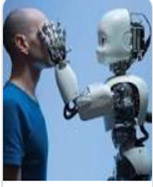
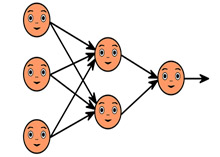
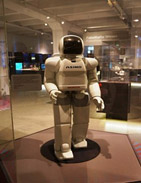
Artificial Intelligent is the science and engineering of making intelligent machines, especially intelligent computer programs (John McCarthy). Artificial Intelligence changed our life because this technology is used in a wide area of day to day services. It is used to develop machine slaves for speeding up our work by fastening accurate result by reducing human effort. It is a field of computer science that attempts to simulate human intelligence and human capabilities with the help of machines, software, and computer platforms. It uses digital technologies which have made us smarter and more productive, transforming how we communicate, learn, shop and play. Advances in Artificial Intelligence are giving rise to computing systems that can see, hear, learn and reason, creating new opportunities to improve education and healthcare, address poverty and achieve a more sustainable future. Artificial Intelligence is playing vital role in transportation service, Healthcare, Financial, Insurance, Retail, High-Tech, Telecommunications, Utilities, Energy Resources, Manufacturing, Assembly, Agriculture, Mining, Consumer Packaged Goods, Social Services and Construction.
Cloud computing using artificial can enables businesses. There are many benefits of cloud computing. It can help in improving personalised shopping experiences. It is able to identify patterns in customers’ browsing habits and purchasing behaviour. Artificial Intelligent is able to provide highly accurate offers to individual customers. Most customer interactions, such as emails, online chat, social media conversations and telephone calls, currently require human involvement. Artificial Intelligent is used for automating customer interactions. Artificial Intelligent based Chatbots can interact with unlimited customers at the same time and can both respond and initiate communication. Artificial Intelligence also can be used for Real-time Assistance. Bus companies are already tracking the location of their buses and provide travellers with real-time updates about where the bus is along its route and its estimated time of arrival. Data mining is very important application of Artificial Intelligence which is able to quickly discover important and relevant findings during the processing of big data. Artificial Intelligence plays vital role in operational automation which operates other technologies that increase automation in business. AI uses facial recognition to spot and track suspects helps to catch criminals. Another advantage of Artificial Intelligence is that it is able to predict outcomes based on data analysis. It sees patterns in customer data that can show whether the products currently on sale are likely to sell and in what volumes. It will also predict when the demand will tail off. This can be very useful in helping a company purchase the correct stock and in the correct volumes. It is used to improve the recruitment process. Artificial Intelligence systems provide businesses with a wide range of benefits, including personalised marketing, customer service, operational automation, inventory management and recruitment. Artificial Intelligence used to handle numerous activities in the bank. It handles work like financial operations, Money investing in stocks, Managing different properties and much more. In medical science, Artificial Intelligence is used to create virtual personal health care assistant. They are used for research and analytics. Even healthcare bots are also introduced to give customer support. Bots are used for scheduling an appointment in hospitals. And the most important thing they give 24/7 assistance. In big manufacturing company Artificial Intelligence are mostly used in the production unit. They are used as a robot who give a different shape to an object, who displace object from one place to another, they are used as a convey belt and much more. All most all the activity which performed to control air transportation is based on Artificial Intelligence technologies. There is different software designed on the Artificial Intelligence platform to give better flight to passengers and feel free from the danger. Computer and TV games got more development and updates in their fields. Super Mario is considered as the best game.
1. Industry 4.0 and Artificial Intelligence
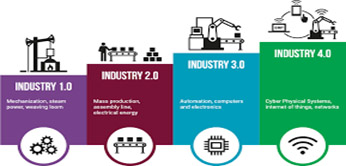
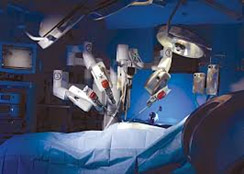
There are four stages of Industrial Revolution. The first revolution occurred towards the end of the 18th century which was mechanical production on the basis of water and steam. The second Industrial Revolution at the beginning of the 20th century happens during the introduction of conveyor belts and mass production. The third revolution takes place in the digital automation of production by means of electronics and information technology system. Today, the industrial landscape is again being transformed to the fourth stage with the rise of autonomous robots, contemporary automation, cyber-physical systems, the internet of things, the internet of services, and so on. Industrial robots, which are one of the key drivers in Industry 4.0, have evolved considerably since the last decades of the 20th century. U.S. has defined industry 4.0 like the Internet of Everything. Industry 4.0 is nomenclature like “Smart Production”, “Smart Manufacturing”, “Smart Industry” or “Smart Factory” are used in Europe. In a different field of interpretation, the terms “Advanced Manufacturing” or “Predictive Manufacturing” embrace a broader spectrum of modernization trends in the manufacturing environment. Advanced manufacturing is main aspect of industry 4.0. It can defined as: “a family of activities that depend on the use and coordination of information, automation, computation, software, sensing, and networking, and/or make use of cutting edge materials and emerging capabilities enabled by the physical and biological sciences. Industry 4.0 is an intelligent manufacturing system, which focuses on the design, manufacturing and in providing customized product and services as per the individual requirements. It encourages the integration of different intelligent manufacturing systems and advanced information technologies. Industry 4.0 specifically involves a radical shift in how production shop floors currently operate. Defined by many as a global transformation of the manufacturing industry by the introduction of digitalization and the Internet, these transformations consider revolutionary improvements in the design and manufacturing processes, operations and services of manufacturing products and systems. Industry 4.0 has been labelled differently, for instance Smart Factories, Smart Industry, Advanced Manufacturing or Industrial Internet of Things (IIoT). A smart factory is referred to as the use of new innovative developments in digital technology including “advanced robotics and artificial intelligence, hi-tech sensors, cloud computing, the Internet of Things, data capture and analytics, digital fabrication (including 3D printing), software-as-a-service and other new marketing models, mobile devices, platforms that use algorithms to direct motor vehicles (including navigation tools, ride-sharing apps, delivery and ride services, and autonomous vehicles), and the embedding of all these elements in an interoperable global value chain, shared by many companies from many countries. Within the context of Industry 4.0, the factory of the future will enable the connection between machines and human-beings in Cyber-Physical-Systems (CPSs). These new systems focus their resources on the introduction of intelligent products and industrial processes that will allow the industry to face rapid changes in shopping patterns. Industry 4.0 also promotes the use of big data, IoT and Artificial Intelligence (AI) as one. It creates an environment in which smart machines can communicate with one another, not only to enable the automation of production lines but also to analyze and understand a certain level of production issues and, with minimal human involvement. From the analysis performed, it can be seen that the implementation of certain technologies, such as virtual and augmented realities, 3D-Printing and simulation, results will all result in opportunities. On the other hand, big data analytics, cloud technology, cyber security, the IoT, miniaturization of electronics, RFID, robotics, drones and nanotechnology, M2M and BI could be opportunities or threats for the organizations. Some clear benefits can be identified from the implementation of Industry 4.0. The most relevant benefits are increased flexibility, quality standards, efficiency and productivity. This will enable mass customization, allowing companies to meet customers’ demands, creating value through constantly introducing new products and services to the market. Moreover, the collaboration between machines and humans could socially impact the life of the workers of the future, especially with respect to the optimization of decision making.
It is highly dependent on innovations like additive manufacturing technologies, process automation, Internet of Things (IoT), artificial intelligence, big data, automation, virtual reality and robotics. It is a new phase of development to create new developments in the various medical fields, including orthopaedics. Product customization is the desired requirement in orthopaedics because patient-specific implants and devices vary from patient to patient. Industry 4.0 consists of a smart manufacturing system that easily fulfils the customized requirements in orthopaedics. It helps through quick design and manufacturing of high-quality implants with different shape and size, bio-models, surgical tools, and other orthopaedic tools and devices. Virtual reality provides better information to doctors and patients and is quite useful for simulations and 3D view of the equipment and of the patients. Holography can help in better teaching and training. Thus, Industry 4.0 helps to improve the quality of surgical planning and reduces patient suffering. In future, Industry 4.0 will adapt to the world-class manufacturing system that efficiently creates smarter medical as well as orthopaedics products. Skin cancer is actually very treatable, but only if it’s caught early and the signs are spotted by the eye of a trained dermatologist with a dermatoscope. Stanford researchers use deep learning and image recognition to spot the warning signs of skin cancer with 91% accuracy.
Many companies are using Artificial Intelligence to increase sales, productivity, speed, efficiency, segmentation, targeting, compliance, conversions, create new products and, of course, generate significant business growth. Alibaba Group, Chinese multinational company specializing in e-commerce, retail, Internet, AI and technology. Alibaba uses AI to help map the most efficient delivery routes. Amazon’s helps drive the algorithms that are essential to Amazon’s targeted marketing strategy and used to predict what products will be the most demanded in future. Coca-Cola’s Amatil is the largest bottler and distributor of non-alcoholic, bottled beverages in the Asia Pacific. Cognizant Digital Business has developed an Artificial Intelligence based machine learning solution for the compliance function at leading healthcare services. Cognizant’s system uses text analytics and an advanced machine-learning algorithm to mine physicians’ notes and electronic medical records. Rakuten Institute of Technology, are able to analyze their 200 million products to forecast sales with a high degree of accuracy. Now they are also capable of segmenting buyers more accurately using real-time data. Under Armour is an American manufacturer of sports footwear and apparel, built an app using the IBM Watson Cognitive Computing platform. The “Cognitive Coaching System” was designed to serve as a personal health assistant by providing users with real-time, data-based coaching based on sensor and manually input data for sleep, fitness, activity and nutrition. Business using Artificial Intelligence can help to review about jobless ratio, Philips Curve, performance, management, CRM Analytics, customer relationship management, sales, strategic planning, mass production, Purchasing Power Parity, GDP, inflation, money, Central Banks, Banking System, coaching, training, accounting, taxes etc.
These rapid technology changes also raise complex questions about the impact they will have on other aspects of society: jobs, privacy, safety, inclusiveness and fairness. Although there are numerous benefits that are can be seen, but with every great innovation, there is also a certain amount of risk. One of the greatest risks could be of this technology being used for destruction or other foolish activities. If this does happen, the very technology that we create can kill us in the near future. In order to take care of this crucial aspect, there are many organizations and scientists that are pushing for regulatory oversight on AI application and systems. The oversight needs to be on the national and international level so that all the countries can be at peace and experience growth in their respective countries. However, there are various laws, regulatory guidelines, and procedures that monitor the use of artificial intelligence in today’s time, and so the safety of us humans is always the prime concern here.
References:
[1]. The 4th Industrial Revolution, Responding to the Impact of Artificial Intelligence on Business, Book written by Mark Skilton and Felix Hovsepian.
[2]. Chayakrit Krittanawong at.el., “Artificial Intelligence in Precision Cardiovascular Medicine,” Journal of the American college of Cardiology Vol. No. 69, No. 21, 2017.
[3]. Author: Luis Fernandez-Luque Muhammad Imran, “Humanitarian Health Computing using Artificial Intelligence and Social Media: A Narrative Literature Review”, International Journal of Medical Informatics, 2017.
[4] Francesco Pilati and Alberto Regattieri, “The impact of digital technologies and artificial intelligence on production systems in today Industry 4.0 environment”.